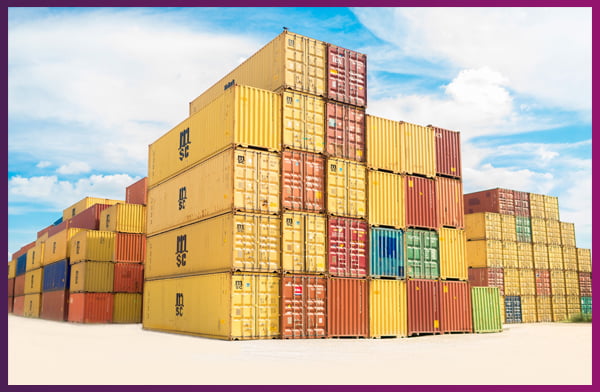“It’s a logistical nightmare” is a common phrase – albeit not one you will hear at NSC – borne of the anxiety of coordinating a big project.
In a general business sense, logistics is the management of the movement of things between the point of origin and the point of consumption.
For multinationals, managing movement also means crossing borders, oceans and customs officers.
When a company opens a new office in Lagos, can’t they just post spare laptops to Nigeria?
It’s not quite as simple as that: Global logistics means expensive haulage, integrating systems, environmental concerns, taxes, navigating local customs and cultures, layers of administration and regulatory quagmires. For a company with thousands of international employees, this is daunting, both financially and practically.
And in 2018, you can add shifting geo-political relationships, new trade deals, temperamental presidents, surprising referendum results and economic uncertainty, and you can see why the job of global logistics is outsourced to expert partners.

THE TRADITIONAL CHALLENGES
The ‘traditional’ challenges of logistics include cultural, practical and financial issues. Part of the challenge is that these are usually in flux, making up-to-date and expert knowledge essential.
Customs, taxes and duties – Almost all countries charge taxes on imported goods. Were it a flat rate across the globe, it’d be simple; but it’s rarely a flat rate even within countries.
The tax paid on imports can depend on agreements with other countries, set annual quotas on the materials being imported, or quantities being shipped. Not paying these duties ensures goods languor at ports and airports until they are.
When shipping millions of pounds’ worth of goods, having the knowledge to take advantage of tax exemptions or discounts can be extremely economical; equally, so can knowing when not to ship goods, but purchase them in the country where they’re required.
Culture – A working knowledge of local cultures helps speed up transit when transporting goods within a country. This includes understanding religions, regional customs, greeting without causing or planning work on a national holiday.
Regulations – A vehicle that’s road legal in Burundi might not be in Belgium, or a medicine that’s considered safe in the United Kingdom might not be in the United Arab Emirates. Regulatory knowledge is essential to avoid goods being rendered useless in the destination country.
Integration – Moving hardware from one place to another does not mean it’s ready for use. Plugs may need to be changed and software reconfigured for a new locale.
Some logistics partners will simply move materials and that’s it. Others, such as NSC, will make sure the transported goods work in the destination country, and integrate with existing systems.
Resourcing – Managing logistics is resource heavy. Moving hardware between continents involves warehouse staff, lawyers, project managers, drivers, fixers and more, making in-house logistics financially unviable for most companies. A logistics partner can pool people and knowledge across projects, leveraging economies of scale to transport equipment at a financially viable rate.
Licensing – Licensing is often overlooked when thousands of devices need to be moved around the world. After all, software will work in any country, and won’t be damaged in transit. However, while software will work, the licence of that software may not be intact once the hardware has travelled.
A specialist IT logistics partner will ensure this doesn’t happen, by asking the right questions and procuring the right licenses on behalf of the client.
Procurement – Is it cheaper to transport your goods across the seas, or buy them in the destination country? Proper procurement professionals will answer these questions, saving multinationals large sums of money.

THE NEW CHALLENGES
The world is changing fast, and geo-political changes are making the world more uncertain – which makes global logistics more complex.
Brexit – Frictionless movement in the EU means hard drives can be loaded in Manchester and delivered to Munich without stopping at borders and without getting stung by customs duties.
Brexit, although not finalised, will invariably add expensive administration to this, and probably expensive taxes and time-consuming border stops and checks.
More costly however, is not knowing what will happen. Officials at the Port of Rotterdam have delayed investing in the port until the terms of Brexit are clear, causing a supply chain bottleneck and meaning international companies are not encouraged to use the port. It’s hard to plan for the unplanned.
NAFTA – Donald Trump has made a lot of noise about re-structuring or pulling out of the North American Free Trade Agreement (NAFTA). Unknown changes in trade deals make it almost impossible for multinationals to plan properly, resulting in cautious spending and a fear of large, cross-border logistics projects.
Paris Climate Agreement – Logistics companies and multinationals can no longer circumnavigate the world burning fossil fuels with impunity. Multinationals must consider the environmental impact of transportation and growth, and their logistics partners must also consider legal carbon emission quotas and company sustainability targets when planning and advising on big moves.
GDPR & data protection – You cannot move a hard drive full of confidential data from the USA to Europe without considering how the data on it is used or removed. Data regulation is increasing around the world, and the rules between countries don’t necessarily match.
For example, Facebook have recently relocated millions of users’ data from Ireland to California to avoid GDPR in Europe.
An effective logistics partner for the modern multinational must be aware of the rules surrounding the movement of digital bytes as much as the movement of tangible goods.

THE OPPORTUNITIES
Our new world does not only present problems for the logistics industry; advances in tech and energy present opportunities too.
Autonomous vehicles – Transportation is incredibly resource heavy. Self-driving boats, lorries and cars will save logistics companies millions of dollars in salaries that can be passed on to their customers. This autonomous revolution is also taking place in warehouses, with robots gathering goods. It’s conceivable that one day hardware will be transported from A to B, untouched by human hands.
Cloud & remote working – Whether goods will need to be moved in the future is another question: cloud computing means bulky servers are already being liberated from the office, and increased trend for remote working is liberating workers from the office too.
These trends towards increased mobility and cloud services mean multinationals will be able to streamline many of their logistics needs.
PCaaS – Cloud computing is extending from storing data and files off-site, to storing entire devices off-site. PC-as-a-Service is taking off, as companies such as Shadow now provide a service which can turn just about any connected device into a high-spec gaming PC.
For multinationals, this could mean streamlining their entire IT service into one location, taking the cost benefits that would offer, and providing a disparate work force with screens only.
Blockchain supply chain – Blockchain can give absolute clarity on where goods have come from, where and what slows down the supply chain, how it can be made more economical, and where accountability for supply chain failures lie.
This level of transparency can also help to address ethical concerns concerning child labour, origin of materials and packaging waste.
Renewable energies – Global logistics and transportation is becoming hamstrung by the need to stop burning fossil fuels and adhere to environmental regulations. Clean energy, and efficient vehicles, allays these concerns.
IN SUMMARY
Global logistics is a complex business, with an almost infinite number of points at which things can start to go wrong, and it’s essential to have a partner with the particular expertise that the operation requires, and the experience to fix the inevitable problems quickly. IT logistics doesn’t only include transport, but must include licensing, systems integration and staging too.
Global logistics is an expensive business; but not as expensive as attempting international removals without a trusted partner.


